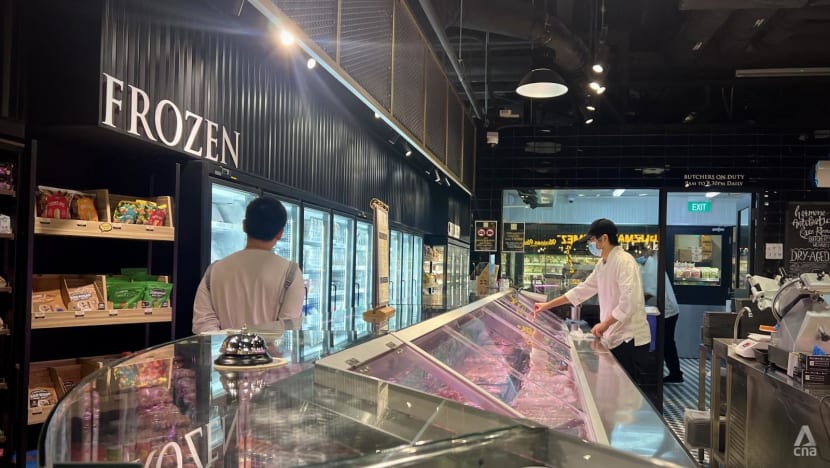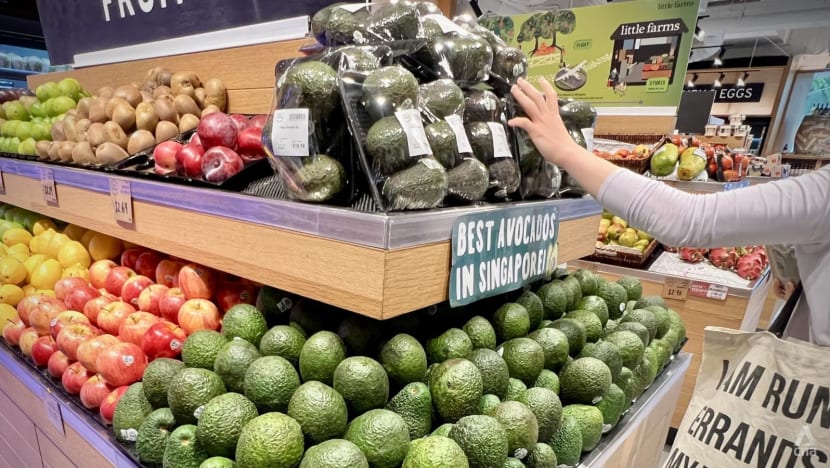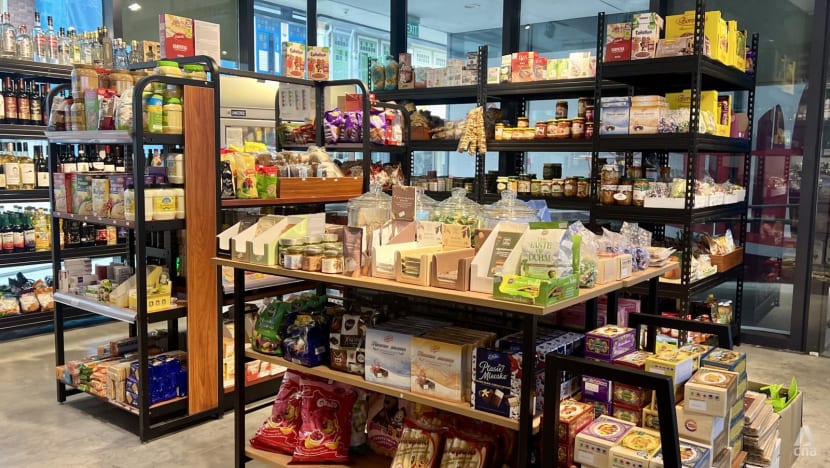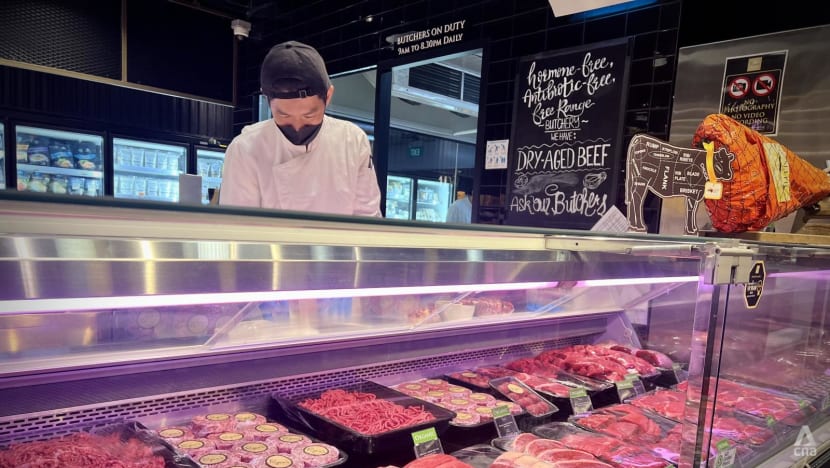Fresh, niche and here to stay: Singapore's gourmet grocers adapt to changing tastes
As competition heats up in Singapore’s grocery landscape, a new breed of gourmet supermarkets is carving out space. CNA explores the appeal of these premium grocers and the challenges they face.

Ryan’s Grocery is part of a growing number of gourmet grocers carving out a niche in Singapore’s highly competitive supermarket scene. (Photo: CNA/Erin Liam)

This audio is generated by an AI tool.
SINGAPORE: On a Friday morning earlier this month, Ryan's Grocery founder Wendy Foo gestures to a video of free-roaming pigs at the store's entrance.
“My animals are happy animals, very happy animals,” she said. “Even the killing is non-suffering.”
That ethos underpins Ryan’s Grocery’s focus on organic meat and allergen-free products – an approach that has earned it a loyal following at its Great World outlet.
“A lot of regulars and those who are experts in eating good quality meat, they know what they want,” Ms Foo said.
Ryan’s Grocery is part of a growing number of gourmet grocers carving out a niche in Singapore’s competitive supermarket scene. These stores cater to a rising demographic of consumers seeking premium, carefully curated offerings – an appetite that has grown amid major shifts in the broader retail landscape.
In March, DFI Retail Group announced the S$125 million (US$97 million) sale of its Cold Storage and Giant outlets to Malaysian retailer Macrovalue. The deal included 48 Cold Storage and 41 Giant stores, along with two distribution centres.
But the sale is not a sign of a shrinking supermarket industry in Singapore. Instead, it reflects a shift in strategy to connect with a changing customer base, said Professor Lawrence Loh from the National University of Singapore.
With an ageing population, supermarkets are now targeting younger consumers, said the professor of strategy and policy.
“These are the people that are now beginning to have a career, beginning to form families, so the new demand will have to come (from) them,” he added.

A HEALTH-CONSCIOUS GENERATION
When Little Farms launched its first outlet in 2016, the emphasis on “fresh and healthy” was still emerging, CEO Joe Stevens told CNA.
“As people get more educated, as people get kind of more affluent, they increasingly make that connection between what they're eating today and their long-term health,” he said.
Today, Little Farms operates seven outlets, with an eighth set to open in July. Its fastest-growing customer segment? Young, affluent Singaporeans.
When CNA visited a Little Farms outlet at Valley Point on a Friday evening, a mix of expatriates and young locals browsed the aisles. Among them was Ms Charlene Zhu, a 35-year-old researcher in the food industry. She shops there almost daily, often picking up specialty dips and cheeses.
“The first thing I would do is look at the labels and then price, of course,” Ms Zhu said. But ultimately, the healthiness and taste of the product still play a bigger factor, she added.
This attention to quality is central to Little Farms’ identity. Sometimes it takes “as little as 24 hours between the time of harvest and when the produce is sitting on the shelves for customers”, said Mr Stevens.

MORE "SUPER" THAN "MARKET"
Other gourmet grocers have chosen even narrower niches to stand out. In 2022, Ms Anna Jaeger rebranded Eastern European grocer Bublik to Anna’s Gourmet, with a focus on Central and Eastern European products not found elsewhere in Singapore.
She didn't want to “compete with the bigger guys in the market”, said the 46-year-old Azerbaijan native.
“That niche makes it much more exciting for everyone, of course, for Eastern, Central European people because it’s coming from their home,” she said. “But for locals, it’s even more so because they explore and find something new.”
That strategy appears to be working. Her cold-smoked Atlantic mackerel went viral on TikTok after a few local customers posted about it, and Singaporeans now make up 40 per cent of her customers – up from just 10 per cent when she first started.
On whether the convenience of online shopping poses a threat to gourmet grocers, Prof Loh said many still prefer the tactile experience of in-person browsing, especially at gourmet stores.
The "touch and feel" element of grocery shopping cannot be replaced, he said. “The whole industry now … it's actually more about the ‘super’ than about the ‘marketing’.”
At Ryan’s Grocery, customers can sample products and consult store assistants. One regular, Mrs Chan, praised the butchers for giving good advice. She also likes the cut of the meat – "thick enough for grilling".

The addition of in-store dining, like Ryan’s Kitchen, has helped broaden appeal. Customers can select their meat and have it freshly prepared on-site.
“Increasingly, you must offer an all-in-one total experience,” said Prof Loh. “If you have F&B along with the supermarket, that will bring in a new group altogether.”
NOT ALL PEACHES AND CREAM
Still, not all gourmet grocers thrive. Brands like PasarBella and Bootle’s have quietly exited the market in recent years.
Bootle’s co-founder Ben Scott told CNA Luxury in 2021 that the closure was partly due to rising costs.
“The business has become a boutique grocer and this has the same cost model as any other boutique business. Continuing this would mean Bootle's becoming the same as every other boutique store – expensive," he said.
More recently, East Coast Grocers shuttered when rising rents became unsustainable and more consumers began dining out in the post-pandemic era, founder Sean Lim told CNA.
“I honestly don't think small, standalone grocery stores can do very well, simply because you need scale,” said Mr Lim, who launched the store specialising in fresh produce along East Coast Road in 2020.
It was difficult to rely on a walk-in crowd for business, despite being located in a neighbourhood where the crowd was thought to be "more discerning and affluent", said the 35-year-old, who now works in corporate workspace solutions.
CHALLENGES IN A TIGHT MARKET
Even successful players are not having an easy time. At Ryan’s Grocery, rental costs have jumped 16 to 17 per cent, Ms Foo said.
It is trying not to pass on the cost to customers, but margins are tight. “Now it's not about profit,” the 58-year-old said. “It's about trying to maintain the business and seeing what's next.”
Customer retention is another challenge. “My customers are well-travelled, more knowledgeable on the food they want to consume,” said Ms Foo. “Because they're well-travelled, they're hardly in Singapore.”
Anna’s Gourmet faces similar issues. “Singapore is a place where expats come and go … so they buy a certain time from you, but then they leave. And then the challenge is to get those new customers again,” Ms Jaeger said, adding that her priority is to attract more local shoppers.
Global disruptions also pose a challenge to logistics. The Israel-Gaza conflict recently delayed shipments from Europe, forcing Anna's Gourmet to switch to costly air freight.
As Little Farms grows, it has gained “a bit more purchasing power”, Mr Stevens said. “We've been able to negotiate better buy prices from our suppliers ... and we share some of those benefits with our customers.”
The brand has also evolved beyond premium-only pricing, with a tiered price approach of “good, better, best”.
Mr Stevens said the company is confident that demand for natural and organic food will continue to rise. "We see ourselves doubling our footprint over the next five years,” he said.
Associate Professor David Gomulya of Singapore Management University said the key for gourmet grocers is differentiation.
If their offerings are too similar to traditional supermarkets, they lose their edge, he said. But if they can carve out a clear niche, customers would be willing to pay more.
“What is the alternative? (Customers) cannot import by themselves,” said Assoc Prof Gomulya, who teaches strategy and entrepreneurship at the university.
In a retail landscape defined by change, gourmet grocers that adapt smartly may well endure.
If they disappear, "people will feel a loss ... more than say, the disappearance of a generic supermarket", said Assoc Prof Gomulya. “People will miss them.”














